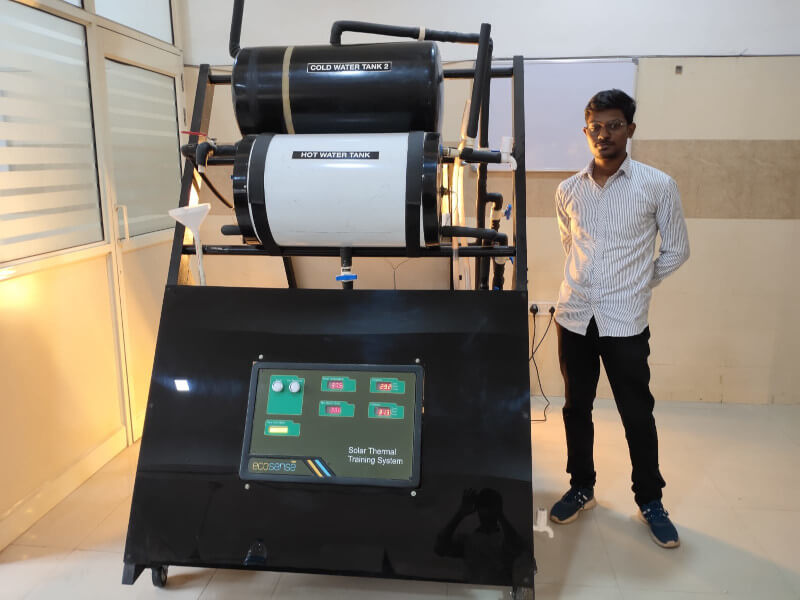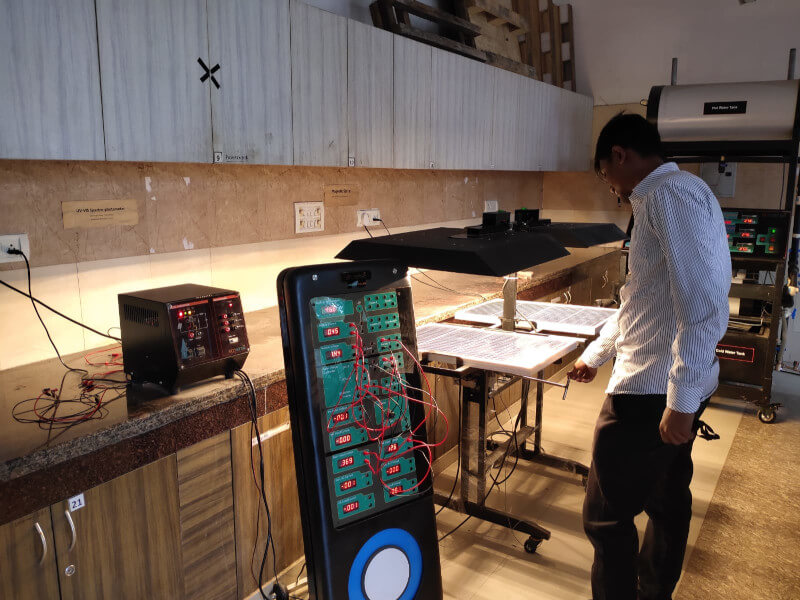The Renewable Energy Lab from Ecosense is welcomed by the department of electrical engineering at J.C. Bose University of Science and Technology in Faridabad. J.C Bose University of Science and Technology formerly known as YMCA University of Science and Technology is the most sought-after university for Engineering in Haryana. It was founded with the goal of advancing science and technology by fusing together academic, scientific, and artistic endeavours. Ecosense supplied four of the Renewable Energy Lab Equipments to the Electrical Department which are as follows:
1. Solar PV Training and Research System
Solar PV Training and Research system is a compact miniaturised version of an actual Solar PV standalone power plant. By studying the wiring and connections between the various system components, the user can gain a fundamental understanding of how a Standalone PV system functions. A student can learn the fundamentals of solar PV, how it can be used in standalone systems, and how to overcome problems such system sizing, MPPT, installations, and others by conducting a variety of experiments. Additionally, the method offers room for additional study. Ecosense’s Solar PV Training and research system enables user to learn about Solar PV standalone technology. Using this system, a user gains knowledge in three fields of Solar PV Standalone system:
a) Physics of Solar PV Panels — I-V and P-V characteristics, series and parallel connection of solar panels effect of irradiation, effect of temperature, effect of shadow, effect of tilting of panels, effect of geographical location etc.
b) Components and Assembly of standalone system — use of blocking diode, use of bypass diode, use of solar charge controller, use of solar inverter, difference between MPPT and PWM charge controllers, AC load, DC load, battery charging/ discharging characteristics, assembly of several components and power flow calculations in each branch.
c) Research in PV systems — Ecosense separately provides a research unit along with standalone experimental system. User can initiate research in the area of maximum power point tracking using this unit. It has provision of providing automatic as well as manual gate signals to charge controller. User can use his/ her own MPPT algorithm with any of the controller to provide manual gate signals.

J.C. Bose University of Science and Technology, Faridabad
2. Fuel Cell Training System
The fuel cell training system from Ecosense is a stand-alone fuel cell system. To run utilities, the output of the fuel cell is connected to a charge controller, which is then connected to a battery, an inverter, and AC and DC loads.
Dry hydrogen is delivered to the fuel cell unit at a predetermined LPM from the hydrogen gas cylinder. A DC load can use the generated power directly, but due to the fuel cell system's V-I curve, which shows that voltage decreases as load increases, this cannot be done. Instead, the output of the fuel cell system is connected to a charge controller, which maintains output in accordance with battery voltage while charging the battery.
The battery bank is also connected to a home inverter so that the fuel cell system can use household utilities as a load.
The Fuel Cell Training System will enable users to comprehend the characteristics of fuel cells with the aid of resistive loads or DC-DC converters, output power variation of fuel cells with change in hydrogen supply, fuel cell performance with DC/AC load, and output variation of fuel cells with change in temperature.

J.C. Bose University of Science and Technology, Faridabad
3. Thermal Energy Storage System
This system has been designed to perform TES related experiment by using PCM materials. As there are several types of PCM, the system has been designed to perform experiment with at least two PCM separately. Provision is also kept to examine the combine (known as cascading) effect of two PCMs in thermal energy storage. To visualize the phase changes in the material another set of arrangement are there in the system.
4. Solar Thermal Training system
Solar Thermal Training System is a small model of real time water heating system and can be used for the characterization and different heat transfer analysis. Different aspects like efficiency, overall heat loss coefficient and heat removal factor and their corresponding calculations can be demonstrated with the help of this system. Special feature of this system is to perform experiments with different wind speeds, different fluid temperatures and different flow speeds.
This system can be divided in three parts viz. main collector system, measuring unit and artificial light unit. Main Collector system consists of a Flat Plate collector with temperature, flow and pressure sensors to measure temperature, flow and pressure of fluid. Measuring unit consists of a measurement panel displaying different parameters and Artificial light unit/ heat generating unit is a Halogen lamp panel to uniformly illuminate the flat plate collector inside a Lab.
Artificial Light facilitates a user to do his/her work without depending on climatic changes in the environment.
Modular and scalable design of the system allows user to move the system in and out of lab easily and conduct experiment with artificial lights as well as actual sunlight. Using the system, a user will be able to study and understand working and operation of a flat plate collector water heating system and its two modes of operation.
The system helps students in practical understanding of various technical parameters such as Overall heat loss coefficient, heat removal factor and efficiency at different varying input parameters like radiation, wind speed, inclination angle etc. The system has inbuilt sensors which measure parameters like pressure, temperature and flowrate placed at different locations in the system. The system has a datalogging device which automatically records and saves all the readings.

J.C. Bose University of Science and Technology, Faridabad
Program Outcome and The Way Forward
After Installation a masters training and demonstration session was conducted by Engineers of Ecosense. During this session, the complete scope, working and research possibilities of the system was discussed. The faculty members enjoyed the demo and training session. They along with students work on the equipment to conduct their research.
